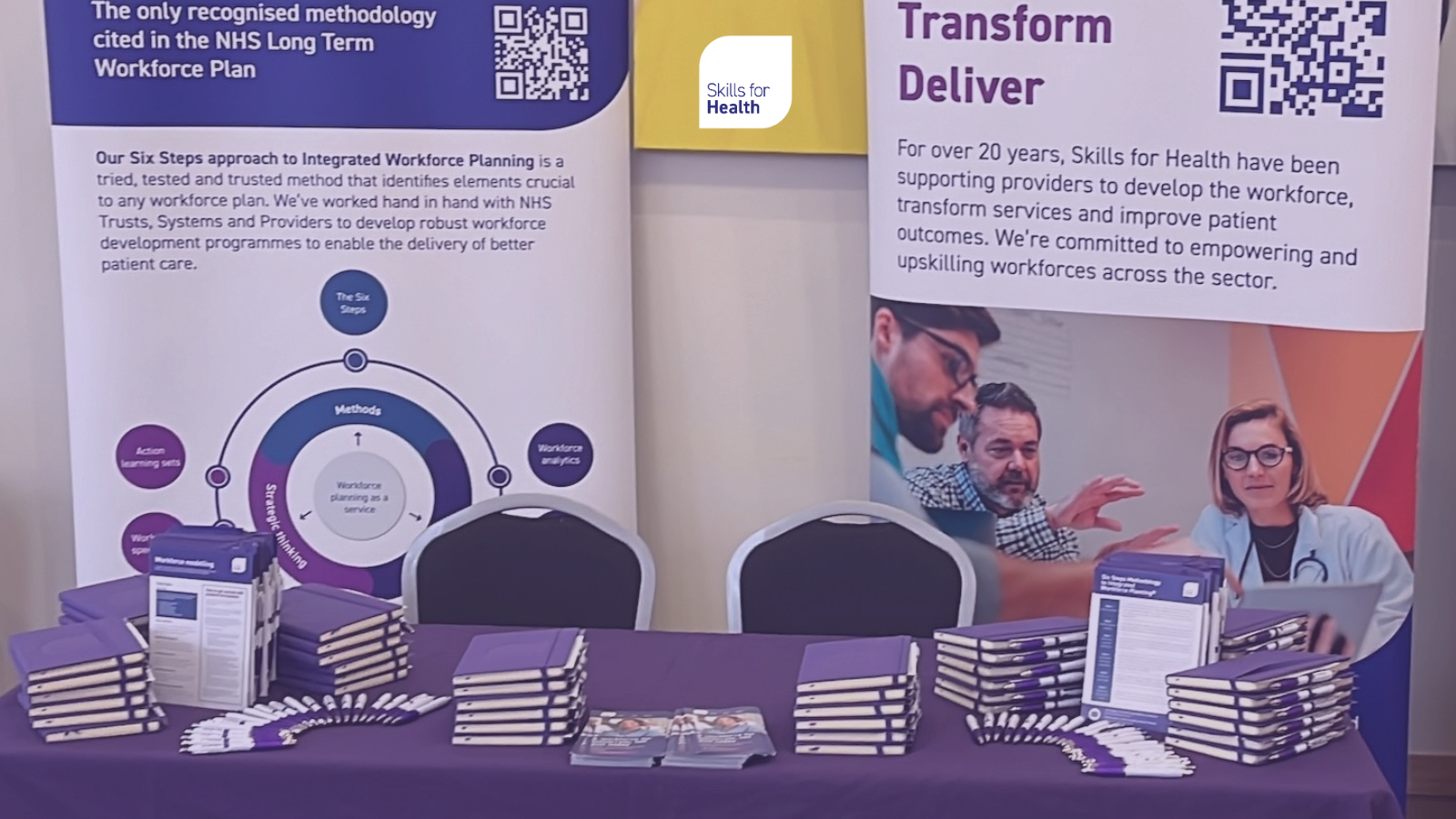
| 1 November 2024
On the 16 and 17 October, Skills for Health attended the Northern Ireland Confederation for Health and Social Care (NICON) for the first time.
NICON is the voice of organisations working across Northern Ireland’s integrated Health and Social Care system (HSC). It forms part of the UK-wide NHS Confederation and is the only membership body for all HSC organisations.
NICON’s membership comprises all six HSC Trusts (including the Northern Ireland Ambulance Service), regional organisations (the Public Health Agency and the Business Services Organisation) and smaller, specialist HSC bodies.
Over 600 health and social care leaders considered and discussed how the health and social care sector can stabilise, innovate, and transform for the future at this time of unprecedented pressure.
We take a look at the conference themes and our key takeaways from this event.
Event themes
The conference hosted an expansive agenda aimed at addressing the immense pressures in healthcare, exploring what positive change could be delivered, how collaborative working could be enhanced and how through creativity the sector could identify which ‘nettles to grasp’ and best support progress.
In the run-up to this conference, members were asked what nettles they believe need to be grasped to drive improvement within HSC. These were condensed into seven key themes below along with some potential ‘dock leaves’ to help grasp these nettles:
Promote honest dialogue with the public – as partners
Helping the public stay healthy, there is a real focus on prevention of ill health, utilising new technologies and changing access to care.
Cultivate a valued and supported health and care workforce
Having a strategic approach to workforce planning, increasing flexibility with places of work and making HSCNI an employer of choice.
Build capacity in communities to manage care
By moving appropriate services from hospitals to the community, investing in social care to avoid admissions and speed up discharges, capitalising on digital innovations and remote care.
Make primary care fit for the future
Build seamless pathways between secondary and primary care, investing in prevention, and work with primary care partners to secure innovation.
Reduce elective waiting times.
Address the longest waits with additional investment, creatively manage lists – people waiting well, and utilise emerging best practices to drive improvements.
Realise the ambition for a joined-up government approach
Focus on children, mental health and ageing well working across sectors and with communities, keeping people well and driving the economy.
Support team HSC – building collaborative capacity to deliver.
Invest in systems working, be open and compassionate, and have clear and sequenced actions which are deliverable.
Key takeaways
During the event, Senior Consultant Theresa Gatfield, supported by Senior Analyst Cat Smith and Technical Consultant Tam Whipp, attended sessions and engaged with conference attendees. Their key takeaways from attending included:
Policy priorities and health inequalities
Health Minister Mike Nesbitt outlined policy priorities, including a strategic plan for Health and Social Care set for autumn release. He stressed the need to address health inequalities, which cost Northern Ireland up to £1.7 billion annually. Women in the most deprived communities experience 14 fewer years of good health compared to those in less deprived areas. Easier access to community-based services is one proposed solution.
Professor Rafael Bengoa recently visited Northern Ireland to advocate for change and close the health inequality gap. His team’s 2016 report offered advice on improving services, cutting waiting lists, and caring for an ageing population.
Balancing community care and regional excellence
There was significant discussion about striking a balance between community care and centres for regional excellence. Hospitals with low patient numbers can cause issues for key specialties, including training and skill development.
System-wide collaboration
Efforts are underway to implement a model aimed at reducing health inequalities and improving patient outcomes by keeping people well and supporting them to stay well. This should decrease demand on health and social care services, enabling them to reduce waiting times.
Public engagement
A public consultation, Hospitals – Creating a Network for Better Outcomes, is underway until January 2025. It aims to engage communities, clinicians, and society in discussions about the need for change, hospital system management, and service delivery pathways.
Innovation in employee and customer experience
Dr Nicola Millard, Futurologist and Principal Innovation Partner at BT, delivered a thought-provoking session on innovation in both employee and customer experience. She highlighted how employees now consider themselves customers, leading to higher expectations of the workplace. Dr Millard’s research shows that phone engagement remains high due to its lower perceived effort compared to webchats or emails, especially in emotionally charged situations. This has important implications for healthcare communication methods.
Learning from other nations
The conference underscored the appetite for change and the need to modernise and become more efficient. Learning from other nations and sharing ideas, such as Wales’ healthcare model and Northern Ireland’s degree apprenticeships, were key takeaways.
Conclusion
The NICON 2024 conference highlighted the need for balancing community care with centres for regional excellence, fostering collaboration, and addressing health inequalities. Key takeaways included the importance of innovation in employee and customer experience, learning from other nations, and focusing on community-based care.
As experts in workforce planning, Skills for Health’s tried and trusted Six Steps Methodology encourages a collaborative approach to developing and maintaining sustainable workforces. Combined with our knowledge of degree-level apprenticeships, we are uniquely placed to help healthcare organisations recruit and retain the right people to support communities and drive improvements in health and social care.
To learn more, contact one of our experts today.
